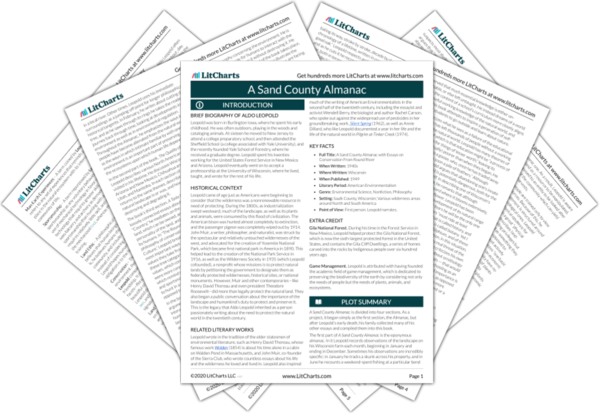Time and History
Within A Sand County Almanac, Aldo Leopold often marks the passing of time by noting the hour, day, week, or season. However, although he divides the first, eponymous part of his Almanac into months, the natural occurrences within each block of time prove more important indicators of changing seasons and natural development than dates on a calendar. Dates are only useful as long as they allow for the monitoring of natural occurrences, but his life…
read analysis of Time and HistoryTypes of Knowledge
Although Aldo Leopold himself attended the Yale School of Forestry and spent the last fifteen years of his life as a professor at the University of Wisconsin, he was acutely aware of the limits of schooling, and of academic knowledge. Instead, in A Sand County Almanac, Leopold extols the virtues of a natural (or naturalist’s) education — one that comes from careful, patient observation of the natural world. He understands the purpose of a…
read analysis of Types of KnowledgeThe Value of the Land
Leopold sees the land not as a resource free for him to exploit, but as a community in which he must participate. In considering the land community, Leopold includes the physical landscape, like rocks and rivers, as well as all the living beings that require the land to survive, including plants, animals, and humans who call the environment their home. He hopes that “we may begin to use it with love and respect.” However, he…
read analysis of The Value of the Land
Ethics and Ecology
Leopold’s primary concern, which spans A Sand County Almanac but is addressed most directly in its final essay, “The Land Ethic,” is the question of how to treat the land respectfully and ethically. He defines ethics as “a differentiation of social from anti-social conduct,” which essentially means that ethics is behavior that takes into account the well-being of entities outside of the self. Ethics were originally concerned with relationships between people, but Leopold proposes…
read analysis of Ethics and Ecology






